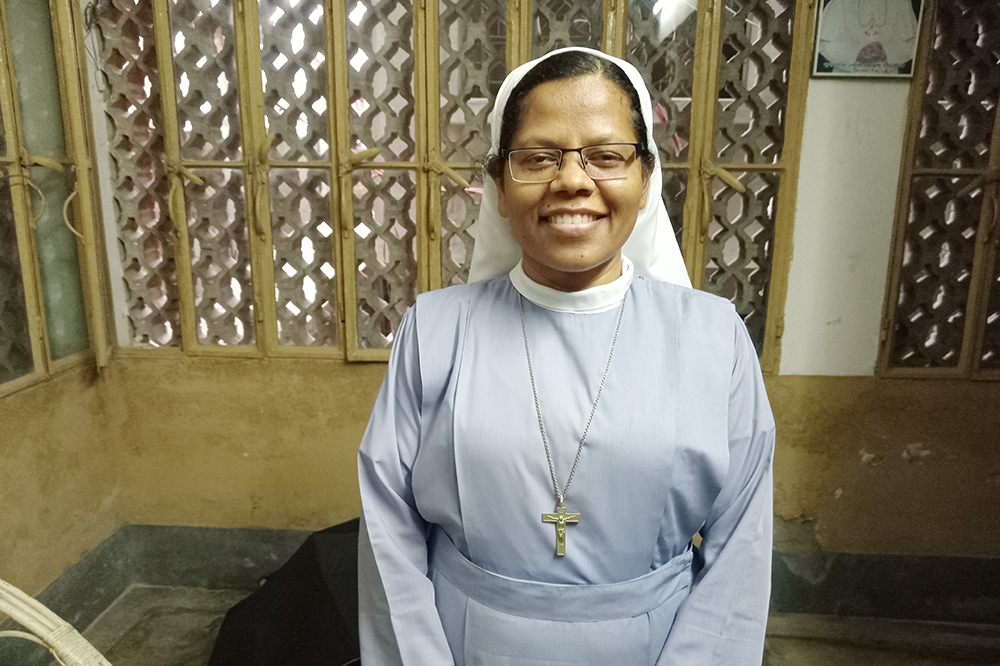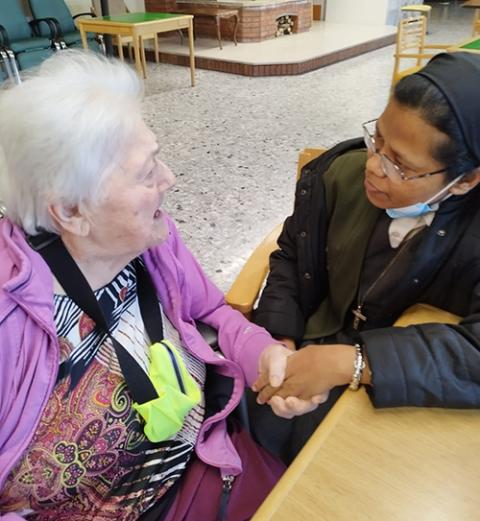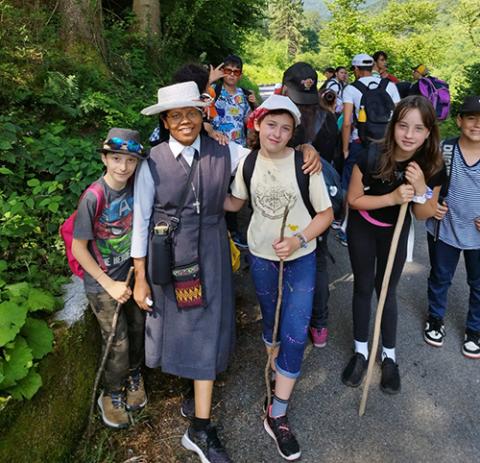
Sr. Lina Magdalina Murmu of the Salesian Missionaries of Mary Immaculate. Recently, she returned to her native Bangladesh for a vacation but has been working as a missionary in Italy since 2018. (GSR photo/Sumon Corraya)
In the 1960s, the grandparents of 41-year-old Sr. Lina Magdalina Murmu, residents of Choupukuria village in Dinajpur, Bangladesh, were baptized by Italian PIME Missionaries. Sixty years later, their granddaughter became a missionary in Italy.
Murmu, a member of the Salesian Missionaries of Mary Immaculate, serves children, the elderly and migrants in Roveredo in Piano, Pordenone, where she is the house superior. Two sisters from Madagascar also live with her as missionaries.
Her mission involves listening to elderly individuals who often find themselves alone. She provides them with Holy Communion and offers prayers, particularly for those who are ill. She told Global Sisters Report the seniors she meets are delighted to see a young missionary nun from an Asian country witnessing Jesus Christ. Many of them find peace after sharing their thoughts with her.
Murmu shared that most young adults do not attend Sunday Mass regularly. Consequently, their children are unfamiliar with Catholic prayers, attending Mass only during Christmas, Easter and funerals. To address this, she teaches catechism to local Catholic children and hopes to see them become more involved in church activities.
Advertisement
In addition to her work with the elderly and children, Murmu supports migrants from Pakistan and other Asian countries. She helps them learn the local language and provides them with food and help from local parishioners. Her pastoral work also includes singing songs in Italian, further integrating into the community and enhancing her missionary efforts.
Overall, Murmu enjoys her missionary life in Italy despite occasionally hearing negative comments. "But my parishioners love and respect me very much," she added.
She admires the disciplined lifestyle of Italians and observes that, as a developed country, Italy needs more spiritual care as mostly sick, elderly and retired people regularly attend church.
Recently, Murmu returned to Bangladesh for a vacation and spoke to GSR about her formation as a religious and her life as a missionary in Italy.
Global Sisters Report: Please tell us about your childhood.
Murmu: I was born in Choupukuria village, a remote area of the Nijpara Parish in the Diocese of Dinajpur, northern Bangladesh. Our school was seven kilometers from home, and we used to walk there. We were eight siblings, and three or four girls attended school together for safety reasons. On the way, we often faced [sexual harassment], but later, our elder brothers started accompanying us to school. I wanted to learn to ride a bicycle, but my brothers didn't allow it, fearing I might face harassment.
After completing my education, I learned sewing for a year at a sewing center in our parish. In 2004, I joined the Salesian sisters in Dhaka after finding their address. Adapting to life in Dhaka was challenging because it was my first time in the city, and I couldn't even cross the road alone. I also struggled with the Bangla language, as my native language is Santali, from the Santal tribal community.

Sr. Lina Magdalina Murmu visits an elderly, sick Catholic parishioner of the St. Bartolomeo Parish and gives her Holy Communion. (Courtesy of Lina Magdalina Murmu)
How did you get the call to become a missionary?
After becoming a sister, I served six years at the convent in Mymensingh, where our congregation's motherhouse is, managing the sewing center. I completed my higher studies and took my final vows in 2017. Later, I was in charge of the sewing center in the Noluakuri Parish. In 2018, my superior selected me for a mission in Italy, and I happily accepted, arriving on Aug. 24, 2018.
What services do you provide as a missionary in Italy?
My first assignment was at Roveredo in Piano, where I still serve. I assist the parish priest in preparing for Holy Mass, lead hymns during prayers, and teach catechism to children and youth. We frequently visit families, especially the elderly and sick, who cannot attend church and request Communion. Many are wealthy but live alone, as their children and grandchildren live separately, which is part of the culture here. Though they feel lonely, they brighten up when we visit and bring them the Eucharist.
I enjoy pastoral visits, but I've noticed that while the elderly are eager to receive Communion and share their faith, most youth are uninterested in religion.
For family visits, we make a list of vulnerable individuals and arrange appointments, and some senior citizens call us to request visits. When I meet with those who are lonely or sick, they open up about their struggles, and after sharing with me, they feel lighter and express their gratitude. Most elderly people prefer to remain in their homes, doing their chores as long as they can, although some are cared for by their children. I visit one or two families each day, and after learning to drive, I can manage the visits independently.
I also serve as a teacher at the parish daycare center for children aged 3 to 5.

Sr. Lina Magdalina Murmu with her students in Roveredo in Piano during a summer camp. (Courtesy of Lina Magdalina Murmu)
You once barely spoke Bangla and lived in a remote village in Dinajpur. After moving to Dhaka and becoming a sister, you now serve as a missionary in Italy — how did you acquire your skills?
This journey was not easy. I faced many challenges and worked hard to learn Bangla and English, as my native language is Santali. Later, I also learned the Achik language since most Salesian nuns are from the Garo tribe and speak Achik. During college, I struggled with English, so I avoided distractions like TV and focused on improving my skills.
Eventually, I became proficient in English. I devoted extra time to learning new languages and skills, and when I arrived in Italy, learning Italian was another challenge. After two months of study, I failed my first Italian language test and was deeply discouraged, but I didn't give up. I kept trying, and now I can even sing in Italian, with people often admiring my language skills.
During my pastoral work, I realized the need to learn to drive, as it felt uncomfortable to rely on others for home visits. I eventually learned to drive and passed my test, becoming the only foreign driver in my parish.
What kinds of challenges do you face as a missionary?
When I make a mistake, someone might say, "You've been in Italy for so long and still can't do this?" Those comments hurt and make me feel [limited]. In this country, religious vocations are declining, and most nuns are over 70. Sometimes, I'm tempted to leave religious life, but then I remember that, as a young person, I'm bringing life and energy to those I serve, especially the elderly. Some people also say, "This nun comes from a poor country like Bangladesh for money!" But those who make such comments don't attend Mass.
Fortunately, the local parish priest and parishioners take care of me. When they notice I'm wearing old shoes or clothes, they offer to buy new ones for me, which gives me comfort through their kindness and support.
Do you want to say anything else?
I hope Italians treat me and other missionaries with kindness and cooperation. We've left our families and countries to serve them. I've noticed the joy on the faces of the elderly when they receive Holy Communion; their smiles help me forget all the challenges and pain of missionary life.
In many parishes, there's no singing during Holy Mass due to a lack of singers, but in our parish, we lead the hymns. Music brings life to the Holy Mass. If missionaries are well-supported, more will follow in the future.






